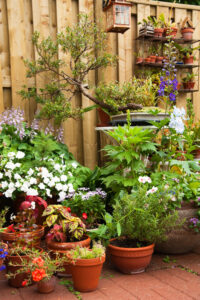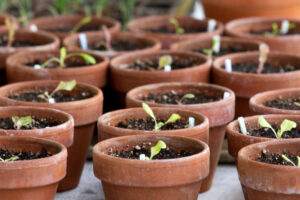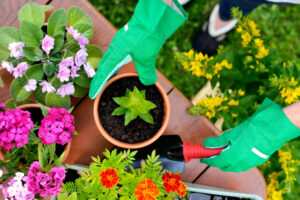It’s an appealing notion, growing your own food. But what if you don’t have the space to grow a flower or vegetable garden? That’s where container gardens come in. They’re perfect for people who don’t have the room – or the time – to plant a larger garden. They also make perfect gifts for friends and family.
There are a number of types of containers to choose from, including clay, wood, plastic, concrete, and ceramic. When picking your container, consider the following:
Drainage
Make sure you’ve found a container with good drainage. Look for drainage holes before you add soil to your container, and be sure the holes aren’t obstructed. A pot with a drainage hole at the bottom should have a saucer underneath.
Room to Grow
Make sure the container is large enough to allow the plant room to grow. When in doubt, get a larger pot. The bigger the pot, the more soil you can add. A larger amount of soil won’t dry out as fast. This is especially important when growing vegetables.
Avoid Heavy Lifting
Save yourself from heavy lifting. Put your container in the place where it will spend most of its time, and then fill it with soil. If you’re planting shallow-root plants in a larger container – herbs, succulents, or annuals – you can fill the bottom third with empty plastic bottles and cover them with a plastic screening. This will save you on soil and make the container lighter.
Choose Container Material
If you’ll be keeping the container outside in the wintertime, choose something like concrete or plastic rather than terracotta, which will break apart after freezing and thawing. And remember that darker colored containers will absorb heat during the summer.

Fill with Soil
Your container needs good soil. Fill it with quality potting soil up to maybe an inch from the rim. You should expect to see the soil settle a bit over time.
Year-round Watering Tips
Container plants need to be watered more often than plants grown in the ground. Add water whenever the soil feels dry. A good way to check: stick a finger in your soil to the second knuckle. If your fingertip feels dry, add water. You should water until you see liquid running from the bottom of the container.
Plant Grouping
If you’ve put more than one type of plant in one container, be sure they all have the same requirements for moisture, sun, and soil. You should be able to find this information on plant labels or seed packets.
Summer Watering Tips
During the summer, most container plants need to be watered at least once each day. Smaller containers and hanging planters need water even more often because they have less soil to hold moisture. If you see your plants dry out and looking limp, don’t fret: they can revive after getting a good drink.
Sunlight
Remember to move your plants so they get enough sun. If you have a large pot, get a wheeled trolley to help you move it.
Pruning & Trimming
Don’t be afraid to prune your plants. When your container garden starts to look ragged, start cutting. By clearing unhealthy sections, your plants will rebound stronger than before.
Setup Drip Irrigation
Keep your expectations realistic. Will you be traveling a lot during the summer? If so, arrange for someone to water your plants, or invest in an automatic drip irrigation system.
Tips for Growing Herbs
If you’re interested in growing your own food, consider starting with herbs. They’re easy to grow, and add a fresh taste to any meal. Conditions may vary: herbs such as rosemary prefer a dryer soil. Basil needs more water and fertilizer.
Tips for Growing Edible Greens
Once you’ve mastered growing herbs, move onto greens. Baby lettuce and spinach are simple. Start in the spring by planting the seeds, and then look for the first sprouts after a week or so before reaching harvestable 3-4 inches. Cut off the largest leaves and you’ll be able to keep your harvest up for quite a few weeks.
Start with the Best Material
 Shop with a reputable local seller. You have a much better chance of finding healthy, pest-free plants at a nursery than a gardening section at a big box store.
Shop with a reputable local seller. You have a much better chance of finding healthy, pest-free plants at a nursery than a gardening section at a big box store.
Following these steps will set your container garden on the right path. Whether you’re growing flowers, succulents, houseplants, herbs, or greens, a container garden brings new life to any space.
Once you’ve completed your gardening, you’ll find that potted plants make excellent gifts for your friends & family. If you still have questions about starting your container garden, contact Mendham Garden Center. We can help your growing season start off right.

